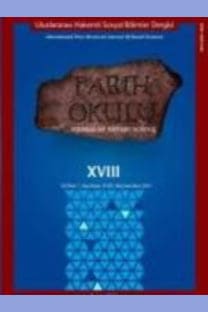PROMOTING INTERCULTURAL COMPETENCE THROUGH AUTHENTIC MATERIALS AND INNOVATIVE WAYS IN ENGLISH LANGUAGE TEACHING IN TERTIARY EDUCATION
Yükseköğretimde İngilizce Öğretiminde Otantik Materyaller ve Yenilikçi Yollarla Kültürlerarası Yeterliliğin Teşvik Edilmesi
___
Byram, M. (1989). Cultural Studies in Foreign Language Education. Multilingual matters Ltd.Byram, M. (1997). Teaching and Assessing Intercultural Communicative Competence. Multilingual mattersLtd.
Byram, M.& Morgan, C. (1994). Teaching-and-Learning Language and Culture. Multilingual mattersLtd.
Byram, M. & Morgan, C. (2008). From Foreign Language Education for Intercultural Citizenship: Essays and Reflections. Multilingual matters Ltd.
Corder L.E. & McLean W.D. (1989). Intercultural training: An Overview, Program and Evaluation. https://files.eric.ed.gov/fulltext/ED313740.pdf, Access date: 09.11.2020.
Cortazzi, M. & Jin, L. X. (1999). Cultural mirrors: Materials and methods in the EFL classroom. In E. Hinkel (Ed.), Culture in Second Language Teaching and Learning (pp. 196-219). Cambridge University Press.
Deardoff, D.K. (2006). The identification and assessment of intercultural competence as a student outcome of internationalization at institutions of higher education in the USA. Journal of Studies in International Education, 10, 241-266.https://www.mccc.edu/~lyncha/documents/ Deardorff-identificationandassessmentofinterculturalcompetenceasanout comeofInternationalizat.pdf, Access date: 09.11.2020.
Everett, M.R., William B. H. &Yoshitaka, M.(2002). Edward T. Hall and the history of intercultural communication: The United States and Japan. Keio Communication Review, 24, 3-26. https://www.researchgate.net/ publication/237548753_Edward_T_Hall_and_The_History_of_Intercultu ral_Communication_The_United_States_and_Japan, Access date: 16.11. 2020.
Gudykunst W.B. (1977). Intercultural contact and attitude change. International and Intercultural Communication Annual, IV, 2-16.
Harmer, J. (2000). How to Teach English. An Introduction to the Practice of English Language Teaching. https://www.pdfdrive.com/jeremy-harmerhow-to-teach-englishpdf-d33406984.html, Access date: 18.11.2020.
Krasner, S. D. (1999). Sovereignty: Organized Hypocrisy. Princeton University Press.
Neuner, G., Parmenter, L., Starkey, H. & Zarate, G. (2003). Intercultural Competence. Council of Europe. https://rm.coe.int/16806ad2dd, Access date: 19.11.2020
Nicoleta L.P., Simona B. & Teodor, C. (2008). Teachers’ Intercultural Competence: Effects of Intercultural Training and Experience Faculty of Psychology and Educational Sciences “AlexandruIoanCuza”. University TomaCozma. http://www.wseas.us/e-library/conferences/2008/venice/ edu/edu10.pdf, Access date: 19.11.2020.
Oxenden, C. & Latham-Koenig, C. (1997).New English File:Intermediate Student’s Book. Oxford University Press.
Кричевская К. С. Прагматические материалы, знакомящие учеников с культуройи средойобитания жителейстраны изучаемого языка // Иностранные языки в школе. (1996), 1(47). [Krichevskaya K. S. (1996). Praqmaticheskiye materiali, znakomyashiye uchenikov s culturoy i sredoy obitaniya jiteley strani izuchayemoqo yazika // Inostranniye yaziki v shkole. 1(47). ]
Новосович, Елена Викторовна. Методическая аутентичность учебного текста: дис. кандидат педагогических наук: 13.00.02. (1999). https://www.dissercat.com/content/metodicheskaya-autentichnost uchebnogo-teksta, Access date: 23.11.2020. [Novosovich Y.V. (1999). Metodicheskaya autentichnost uchebnoqo teksta: diss.candidat pedaqoqicheskix nauk: 13.00.02. https://www.dissercat.com/content/metodicheskaya-autentichnostuchebnogo-teksta, Access date: 23.11.2020. ]
Хухлаев, O.E. & Ю.Чибисова, M. (2010). Теоретические и практические вопросы межкультурной коммуникации: современные тенденции». //Электронный журнал «Психологическая наука и образование», 5, 168-179. https://psyjournals.ru/files/33834/psyedu_ru_2010_5_ Khukhl aev_Chibisova.pdf, Access date: 25.11.2020. [Xhuhlayev O.Y. & Chibisova Y.M. (2010). Teoreticheskie i prakticheskie voprosi mejculturnoy komunikacii: sovremenniye tendencii//. 168-179. https://psyjournals.ru/files/33834/psyedu_ru_2010_5_Khukh laev_Chibisova.pdf. Access date: 25.11.2020.]
- ISSN: 1308-5298
- Başlangıç: 2008
- Yayıncı: Ahmet KARA
ÖĞRETMEN ADAYLARININ AKILLI TELEFON BAĞIMLILIĞININ ÇEŞİTLİ DEĞİŞKENLER AÇISINDAN İNCELENMESİ
Ayşenur KULOĞLU, Fulya Görkem ORHAN
BİR KÜLTÜR OLARAK KATILIMIN YEREL DÜZEYDE YÖNETİME YANSIMASI: ESKİŞEHİR BÜYÜKŞEHİR BELEDİYESİ ÖRNEĞİ
Gökhan TENİKLER, SİNEM ŞAHNAGİL
ÖĞRETMENLERİN DUYGU YÖNETİM BECERİLERİ İLE OKULUN DUYGUSAL İKLİMİ ARASINDAKİ İLİŞKİ
Efraim ÖZTÜRK, MUKADDER BOYDAK ÖZAN
ANTİK ROMA’NIN SALGINLAR İLE GENİŞLEYEN PANTHEONU
TÜRK MÜZİĞİ KEMAN EĞİTİMİNE YENİ YAKLAŞIM
Süleyman Cem ŞAKTANLI, Serdar BUDAK
Antrenörlerin Değerler Eğitimine Yönelik Görüşleri: Elazığ İli Örneği
Yunus Emre KARAKAYA, Abdullah BİNGÖLBALI, Cumaali YAVUZ
THE EFFECT OF ARTIFICIAL INTELLIGENCE ON SUSTAINABLE DEVELOPMENT GOAL
Şebnem ÖZDEMİR, Pınar ÖZUYAR, Mustafa SUNDU
ANALYSIS OF ARGUMENTATION APPLICATION IN TERMS OF LEARNER EXPERIENCES
Sümeyra Zeynep ET, Mehmet Nuri GÖMLEKSİZ
Argümantasyon Uygulamalarının Öğrenen Deneyimleri Açısından İncelenmesi
